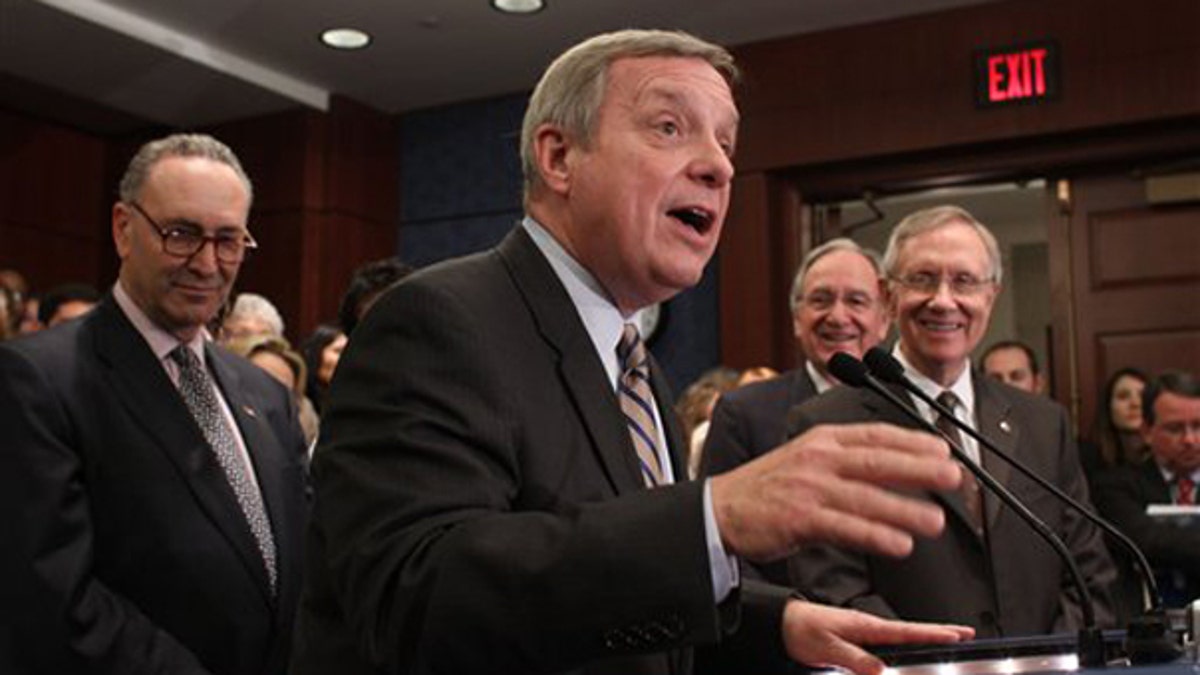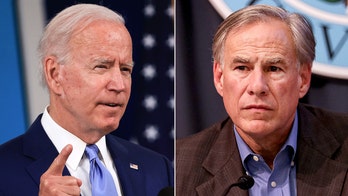
Senate Majority Whip Richard Durbin speaks during a health care reform news conference on Capitol Hill Nov. 19. (AP Photo)
Let the Senate battle begin.
Though Senate Majority Leader Harry Reid has rounded up a cadre of loyalists to help tout his health care reform bill at press briefings, a raft of differences still remain in the Senate that have to be resolved.
Republicans roundly rejected the bill, estimated to cost $848 billion in its first 10 years, after Reid unveiled it Wednesday night. But moderate Senate Democrats are still showing reservations -- and that's to say nothing of the tough negotiations that will have to follow between the House and Senate if the Senate passes its bill.
Sticking points in the Senate are many. Here's a quick look at the key issues that will present hurdles as Reid moves through a series of procedural steps to bring the bill to a final vote. A vote to start debate on the bill has been set for Saturday night, to give lawmakers 72 hours to first review the legislation.
Abortion
Abortion is a battleground in the health care debate. The House of Representatives included strict provisions in its bill restricting taxpayer dollars from funding abortion coverage, leading to recriminations from abortion rights groups as well as the White House.
The Senate bill, likewise, has the goal of fencing off taxpayer dollars from abortion coverage. But critics say the language is not tough enough.
Sen. Ben Nelson, D-Neb., a key Senate moderate whose support is considered vital, told Fox News Thursday afternoon that if the language is not altered he would support a GOP filibuster to prevent the bill from coming to a final vote.
Sen. Mike Johanns, R-Neb., wants Democrats to take even more of a stand and prevent the bill from coming up for debate until the language is changed. Starting debate takes 60 votes, and Johanns called on just one Democrat to break ranks and prevent that from happening.
"Pro-life Americans are waiting, and they aren't fooled," Johanns said.
Reid attempted to restrict federal money from covering abortion in his bill. The government-run insurance plan created by the bill would not cover abortion. The bill requires each state to have one private plan that does not cover abortion and one that does cover abortion in the newly created health care exchange. But the plans are supposed to fence off federal funding so it doesn't go toward that coverage.
Critics say that's not good enough. They want to see the restrictions from the House bill brought to the Senate -- the House restricted abortion coverage in plans that are part of the new exchange where federal subsidies might be used.
Sen. Kent Conrad, D-N.D., a moderate Democrat and chairman of the Senate Budget Committee, expressed reservations about the Senate version.
"I don't think this will pass unless you can assure people taxpayer funds are not being used to fund abortion," he told Fox News. "Whether or not Senator Reid's formulation accomplishes that, I do not yet know."
Conrad later released a written statement saying the bill "sets the goal" of restricting federal funds from abortion coverage.
Public Option
Abortion is matched, or eclipsed, as a controversial issue only by the call for a brand new government-run health insurance plan. Moderate Democrats and Republicans have long expressed reservations about this and it is sure to be on the negotiating table in the weeks ahead.
Reid introduced a more moderate version than the House in allowing individual states to opt out of the so-called public option.
But moderates like Joe Lieberman, ID-Conn., who is key to building a 60-vote coalition needed to break a filibuster, has long said he opposes that plan. Lieberman, who caucuses with Democrats, reiterated his displeasure with the plan Thursday.
"I think it's the last thing to do and we don't need it," Lieberman told Fox News. He said he'll vote with Reid to start debate in a vote now scheduled for Saturday night, but won't vote to cut off debate and bring the bill to a final vote if the public option remains.
"If at the end of the debate, the bill I think is overloaded ... particularly with this government-sponsored public option insurance company, I'm not going to vote for cloture," Lieberman said.
And he said he won't be the only Democrat holding out.
Lieberman said he hopes his colleagues can be "reasonable."
Medicare Cuts
Republicans have been hammering their Democratic colleagues over the nearly half-trillion dollars in Medicare and Medicaid cuts prescribed in the bill over the next decade.
The complaints haven't yielded much, but the GOP is emboldened by a recent report showing the House-passed cuts would lower payments to providers to a degree that they "might end their participation in the program."
Sen. Mike Enzi, R-Wyo., who was part of the "gang of six" senators working on a bipartisan compromise months ago that never materialized, criticized the new Senate bill for this reason.
"The Reid bill is government-centered, not patient-centered," he said in a statement.
Senate Minority Leader Mitch McConnell invoked the same complaint Thursday.
Conrad, though, defended the cuts. He said they're not so much cuts as adjustments to slow the "rate of growth." Besides, he said the doctors and hospitals are willing to cough up the savings because they know they're getting millions more customers through the bill.
Individual Mandate
Democratic leaders long ago decided to include a requirement for Americans to get covered as way to ensure that health care reform reaches more people -- even though President Obama opposed this idea during the presidential campaign. The requirement is still seen as unfair by some lawmakers, especially since it comes with a steep penalty attached.
The Congressional Budget Office estimated that penalties imposed on uninsured individuals and employers who are not providing adequate coverage will add up to $36 billion in the first 10 years.
Taxes
The bill raises $486 billion in its first 10 years, though various tax programs that some lawmakers are picking apart.
One is a tax on high-cost insurance plans -- those over $8,500 for individuals and $23,000 for families. Another revenue generator comes from an extra payroll tax on "high-wage workers."
The measure raises the Medicare tax rate by 0.5 percent for individuals making more than $200,000 and couples making more than $250,000.
Another still, the so-called "Botax," is on elective cosmetic surgery. It's a 5 percent tax on such voluntary procedures which one aide said would bring in about $5 billion for the government.
Cost
The CBO pegged the 10-year cost of the bill at $848 billion. But that doesn't factor in how much health care reform will cost once it's fully operational -- which is expected to happen in 2014.
Republicans are citing an estimate that the bill will actually cost $2.5 trillion over 10 years once the plan is in full force.
Expect more wrestling over the price tag of health care reform in the weeks ahead.
Reid's allies, though, say Republicans are doing nothing but whining.
Sen. Dick Durbin, D-Ill., Reid's deputy in the Senate, challenged McConnell on Thursday to produce a bill that accomplishes all that the Democrats' version accomplishes. And he mocked Republicans for persistently complaining about the physical size of the bill.
"The American people need a fighting chance when it comes to these insurance companies," Durbin said. "The leading criticism about this bill is that it's 2,000 pages long."
Fox News' Trish Turner contributed to this report.




